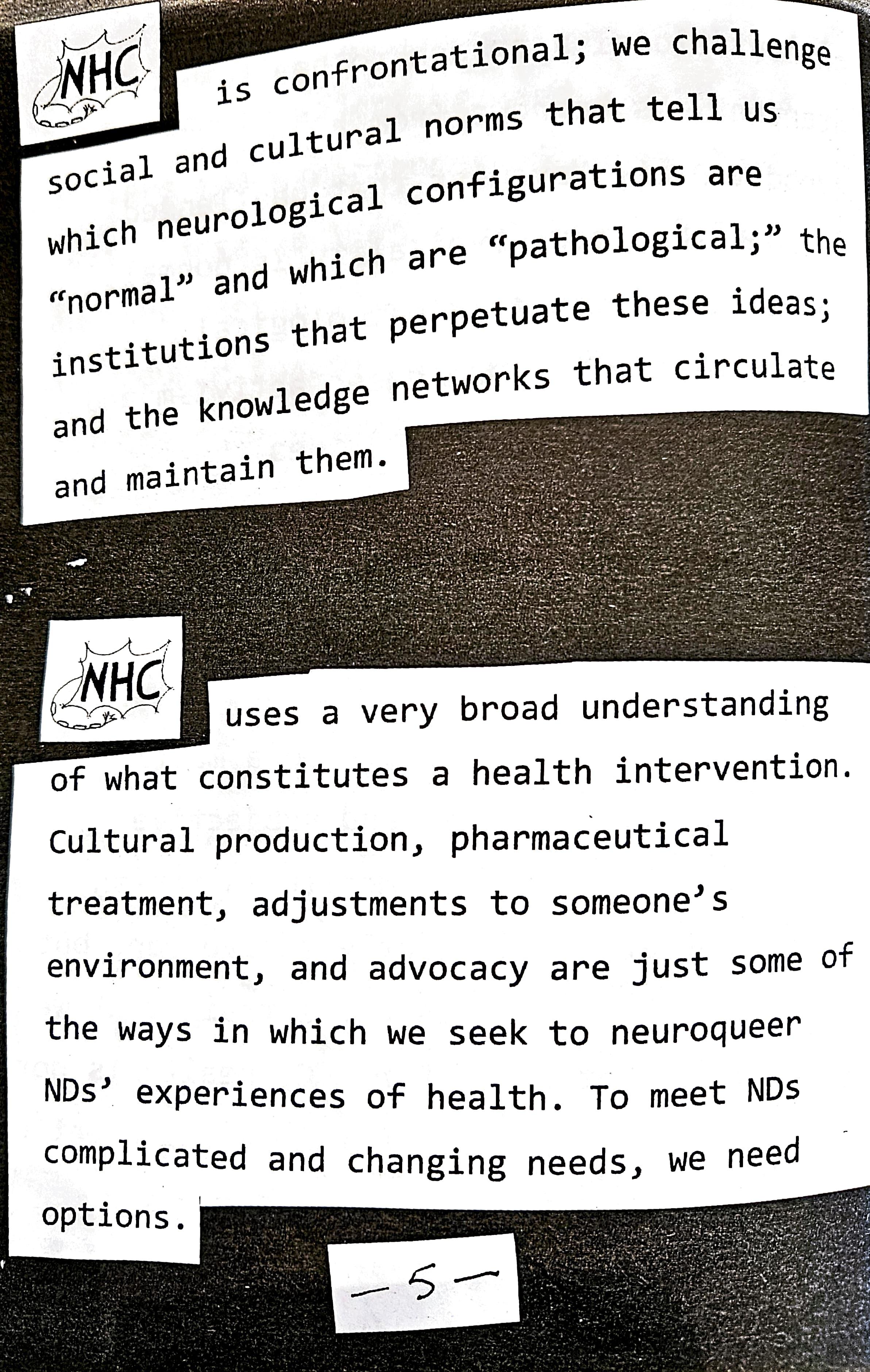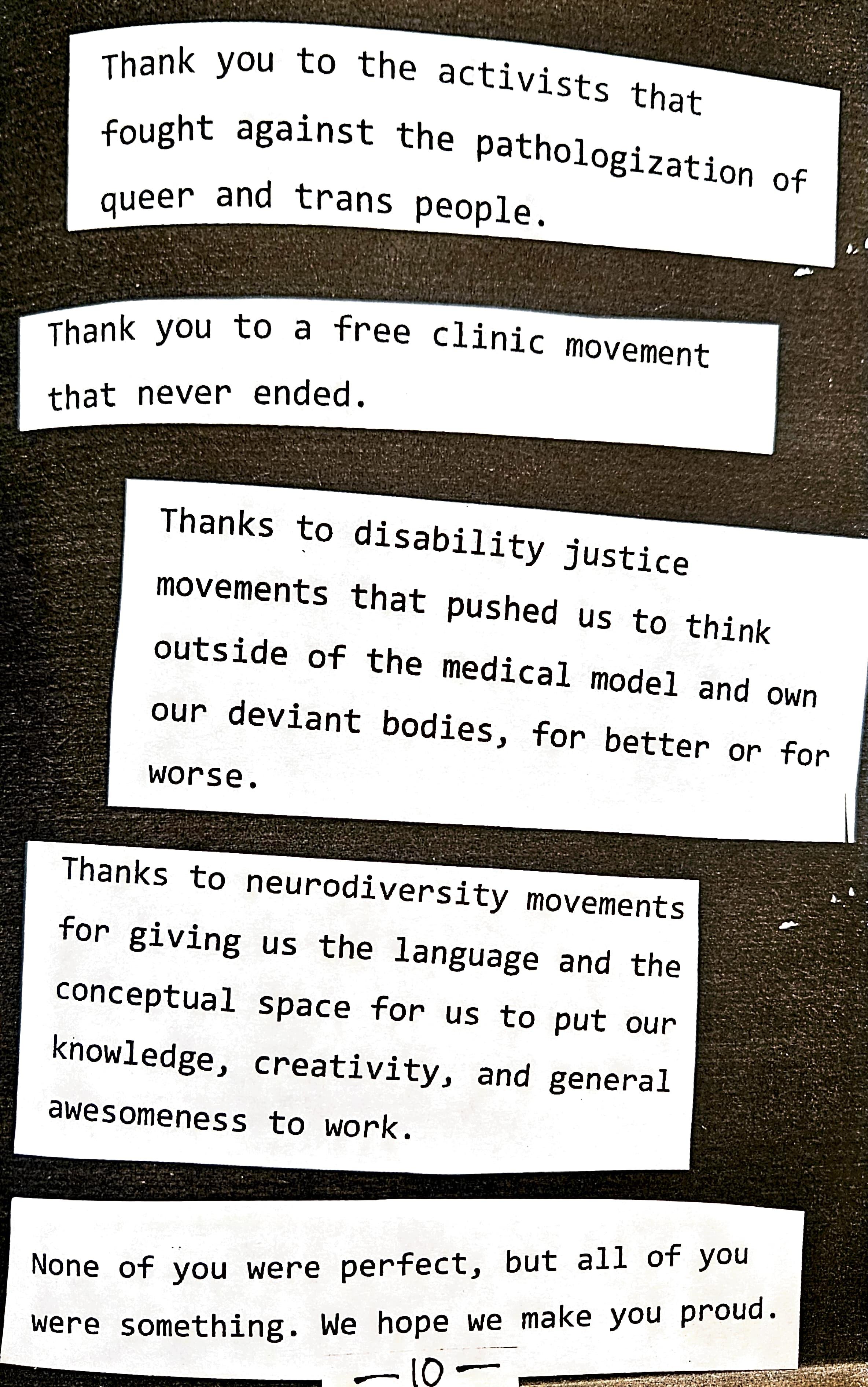

· .· · begins with a neurodivergent perspective. Mainstream health institutions are built by and for neurotypical people (NTs). They reflect and maintain neurotypical privilege. NHc is built by and for neuro.gi vergent people {NDs). It imagines - and enacts systems, practices, and knowledges built by and for NDs. does not adhere to one single definition of what it means to be neurodivergent or neuroqueer. What binds us is a shared experience of marked difference and a collective desire to help each other thrive in a society that systematically marginalizes and excludes NDs.
is neuroqueer ·in all senses of the word. There is always an element of queerness in neurodivergence and an element of neurodivergence in queerness .

. uses the te,fnis "neurotypicalJJ and "neurodivergent" strategically to describe groupings of experiences and traits that shift based on social, political, economic, and embodied context.
Neurodivergence is not a social construction OR a biological condition. It is something much queerer than both.
"neuroqueer"

as
an uses . tive and a verb. NHc . an adJec , identl ty' . nces of those who live t ers the exper1e cen . ns of neurodivergence intersect10 . . . in the It nurtures ex1st1ng and queerness, ls and practices s aces, too , neuroqueer P that help NDs realize fts new ones and era Ith NHC neuroqueers • of hea · our own version . f hatever biomedical the shit out o w · f·nd useful. resources we 1
supports health interventions
'that speak to NDs everyday experiences and C how they do or do not match up with the experiences they want to have. Not all neurodivergent experiences are wanted/desirable. Furthermore, what NDs want/need of their brains isn't the same all the time; it changes with environment, responsibilities, desires, and encounters with others.

irreverent, exploratory, and confrontational approach to health interventions borrows from a Neurodiversity Movement that challenged the idea that neurotypicality is normal and neurodivergence is pathological · (neuronormativity) and queer activism and theory that challenged the idea that heterosexuality is normal and queerness is pathological (heteronormativity).
{.~d thinks of "health" as a limited, but useful term to describe a multifaceted, changeable, and subjective embodied experience. Health is not an ideal that we constantly strive for, but never achieve. It is not a trait that we do or do not have. For NHC, health is not a privilege, nor is privilege dependent on health. Health is how we deserve to experience being a body in this complicated, messy, living world.
is con frontational; we challenge
1 norms that tell us d cultura ·al an . soc1 . 1 configurations are neuro1og1ca . " which . h are "pathological; the d wh1c "normal" an .d . t perpetuate these 1 eas; . . tutions tha 1n st1 d networks that circulate and the knowle ge and maintain them,

~ · uses a very broad understanding of what constitutes a health intervention. Cultural production, pharmaceutical treatment, adjustments to someone's env~ronment, and advocacy are just some of the ways in which we seek to neuroqueer NDs'. experiences of health. To meet NDs complicated and changing needs, we need options. 1
.;JNH( ·: understands that all forms of J hi1:.....Y-'fjY
oppression are connected. Ableism, capitalism, heterosexism, nationalism, white supremacy, sexism, xenophobia, and colonialism are only some of the systems that support and are supported by neurotypical privilege. To challenge one, we must challenge them all. does not limit itself to mediating the effects or teaching people how to cope with living in a world characterized by neurotypical privilege and neuronormativity. We also take aim at their foundations, as well as all other forms of oppression that intersect to create a power structure that fuck us all over.

Utl·ous but not afraid to is ca '
. te mainstream medical (re)appropr1a nd technologies. Huey P. knowledges a d the importance of "survival Newton argue d. volution." With that in mind, pen 1ng re the NHC believes the structures that oppress us can sometimes be rethought/reused/reworked to serve and sustain our communities while we make trouble.

appreciates that diagnostic categories can be useful in some ways for some NDs, but does not accept them as objective, authoritative measures. Our interventions aim for specificity and reflect the knowledge that no health intervention is right for everyone all the time.
. , does not police access. It is a e from which to imagine, distribut 5pac e, and enact health interventions that start with the lives and experiences of those whose brains are considered "abnormai,n "deviant," or "pathological." At different times in the history of western biomedicine, that has included women, racialized people, immigrants, queers, criminalized people, Indigenous people, and so many more marginalized groups.

thrives on the creativity of our membership. We're all about owning our oddities, feeding our eccentric impulses, and playing with the neuroqueer knowledges all around us. Creativity allows us to stretch our limited resources and broaden the scope of our interventions. We're also crafty with tech and produce badass zines.
is a love letter to activist movements that came before us.
Thank you, Boston Women's Health Collective, for teaching us that our words and stories are health interventions.
k Ou Black Panthers, for Than Y , h ·ng us that survival and teac 1 revolution are interdependent.
Thank you, ACT UPI, for teachiDg us that biomedical institutions · can't be left to their own devices.

- Thank you, Jane Collective, for reminding us that people are more important than laws, and Insite, for showing us how to get~a little creative with them.
Thank you to the activists that fought against the pathologization of queer and trans people.
Thank you to a free clinic movement that never ended.

Thanks to disability justice movements that pushed us to think outside of the medical model and own our deviant bodies, for better or for worse.
Thanks to neurodiversity movements for giving us the language and the conceptual space for us to put our knowledge, creativity, and general awesomeness to work.
None of you
were

In addition to the activists and movements referenced in the manifesto, the NHC is heavily indebted to Nick Walker and Athena Lynn Michaels-Dillion's concept, "neuroqueer," and M. Remi Yergeau's work on "neurological queerness." image adaptated from: litt, t.1.(1991). Queer Nation antiviolence march [Photograph]. t.l.litt photography.
https://www.tllittphotography.com/ gallery-image/Queer-Nation/G0000lwykh
doesn't exist in this timeline • yet. Or it does exist, but only in the way that all fictions exist

The Neuroqueer Health .Collecttve (NHC) is the fantasy of neurodivergent academic and noted curmudgeon, ~ydne~ Neuman. "Tablet Tabling: A speculative performance" brings NHC into our timeline for an afternoon. It is a collaboration between Sydney and artist, ally, and all-around dreamboat, Avery Nabata.
